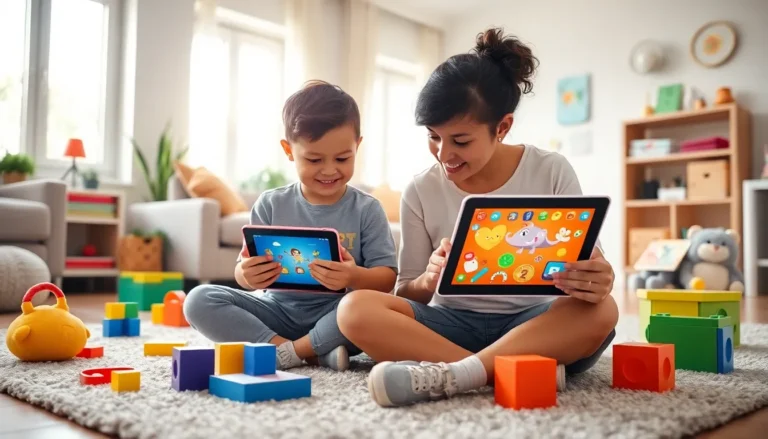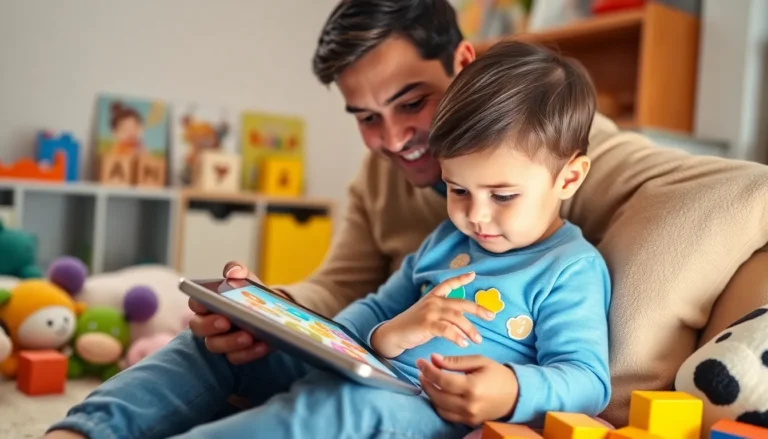Navigating the world of parenting can feel like trying to assemble IKEA furniture without instructions. Enter the terms “solo parenting” and “single parenting,” often tossed around like confetti at a parade. But what do they really mean? While both involve raising kids without a partner, the nuances can make all the difference.
Table of Contents
ToggleUnderstanding Solo Parenting
Solo parenting involves raising children without a partner, often driven by personal choice or circumstances. This form of parenting can impact the dynamics of parent-child relationships.
Definition of Solo Parenting
Solo parenting specifically refers to a caregiver who raises their child independently, often with a strong sense of autonomy. This parenting style may arise from various situations, including the death of a co-parent, separation, or a conscious decision to parent alone. Unlike single parenting, solo parenting emphasizes the singular role of the caregiver without the expectation of sharing responsibilities with a partner.
Characteristics of Solo Parenting
Solo parenting features several distinct characteristics. Independence stands out, as solo parents manage all aspects of childcare alone. Flexibility often defines their routines, adapting to the child’s needs without needing input from another adult. Financial responsibility typically falls entirely on the solo parent, necessitating careful budgeting and resource management. Emotional resilience also plays a crucial role, as these parents navigate challenges with determination and strength.
Understanding Single Parenting
Single parenting involves raising children without a partner or spouse. This situation can arise from various circumstances, including divorce, separation, or being unmarried at the time of a child’s birth.
Definition of Single Parenting
Single parenting refers to the condition where one parent assumes the primary responsibility for raising children. This responsibility encompasses providing emotional, financial, and physical support. Commonly, single parents navigate the challenges of parenting alone, often relying on external support systems. Legal considerations surrounding custody and child support may also play a significant role in this dynamic.
Characteristics of Single Parenting
Single parenting features several distinguishing traits. Full financial responsibility often falls on one parent, requiring careful budget management. Flexibility in daily routines becomes essential to balance work and family life. Emotional strength is crucial, as single parents frequently deal with feelings of isolation and pressure. Establishing a support network is important; many single parents seek out friends, family, or community resources for assistance. Personal resilience aids in overcoming obstacles, making this parenting style distinct from others.
Key Differences Between Solo Parenting and Single Parenting
Solo parenting and single parenting differ significantly in emotional and financial aspects. Solo parents often embrace their role as an independent caregiver, focusing solely on their children’s needs. They bear full financial responsibility without expectation of shared contributions. Financial management hinges on personal income, which may present challenges due to the lack of dual incomes. Emotional resilience becomes essential as solo parents navigate day-to-day parenting without support from a partner.
Single parenting carries its own unique emotional and financial dynamics. It often results from divorce or separation, where financial obligations can involve child support or alimony. Single parents frequently juggle work and childcare, which requires flexible routines. Emotional support from friends, family, or community groups plays a crucial role in coping with stress and isolation. While they possess the same responsibilities as solo parents, single parents usually benefit from established support networks to help manage challenges.
Emotional and Financial Aspects
Solo parenting and single parenting shape emotional and financial experiences differently. Solo parents often rely entirely on their income for financial stability. Emotional strength is vital as they navigate the challenges of parenting without a partner. Single parents frequently deal with obligations from previous relationships, impacting their financial responsibilities. Child support arrangements sometimes alleviate financial pressure, offering flexibility. Emotional support networks help counterbalance feelings of isolation.
Social Support Systems
Social support systems provide varying levels of assistance for solo and single parents. Solo parents might form connections with other solo caregivers, creating tailored support systems. Personal networks can form through friendships or community resources, enhancing their parenting experience. Single parents usually lean on established family and friend networks for emotional and financial support. Access to community services often proves essential in managing responsibilities. These support systems play a critical role in helping families navigate challenges unique to their parenting styles.
Benefits and Challenges of Each Parenting Style
Both solo parenting and single parenting offer distinct benefits and challenges that affect the parenting journey.
Benefits of Solo Parenting
Solo parents enjoy complete autonomy in decision-making. This independence allows for flexibility in creating schedules that suit their family’s needs. Solo parenting fosters a strong bond between the caregiver and child, as it often involves close, one-on-one interactions. Financial management becomes focused solely on personal resources, streamlining budgeting and planning. Stability emerges from the clarity of parental roles, minimizing potential conflicts that can arise in shared parenting situations.
Challenges of Solo Parenting
Solo parenting can lead to feelings of isolation due to the lack of a partner for emotional support. Balancing work and childcare responsibilities creates significant time constraints, often leading to exhaustion. Financial pressures may intensify, as single income streams limit financial resources. Emotional resilience is a critical requirement, as solo parents must continually cope with challenges alone. Accessing a support network may become difficult, hindering social interactions and shared experiences.
Benefits of Single Parenting
Single parents often benefit from established support networks provided by friends and family. Emotional support from peers can alleviate feelings of loneliness and stress. Shared parenting responsibilities with the other parent may offer some relief, depending on the specific arrangement. Financial assistance, such as child support or alimony, can ease financial burdens, providing more stability. Flexibility arises through the ability to co-parent effectively, facilitating collaboration in raising children.
Challenges of Single Parenting
Single parents frequently face intense financial strain from maintaining a household on one income. Juggling work schedules with childcare leaves little time for self-care or leisure activities. The emotional toll of navigating a co-parenting relationship with an ex-partner can create additional stress. Feelings of guilt may emerge, affecting mental well-being and parenting effectiveness. Establishing reliable routines becomes essential yet challenging, given the often unpredictable nature of life as a single parent.
Understanding the distinctions between solo parenting and single parenting is vital for recognizing the unique challenges and benefits each style presents. Solo parents navigate their journey with autonomy and independence while single parents often rely on support systems to manage their responsibilities. Both paths require emotional resilience and adaptability to ensure the well-being of their children.
By acknowledging these differences, individuals can better appreciate the diverse experiences of parents and the support they may need. Whether one is a solo parent or a single parent, the journey of raising children is filled with both trials and triumphs that shape their family dynamics.








